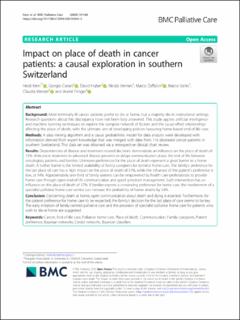Bitte benutzen Sie diese Kennung, um auf die Ressource zu verweisen:
https://doi.org/10.21256/zhaw-20691| Publikationstyp: | Beitrag in wissenschaftlicher Zeitschrift |
| Art der Begutachtung: | Peer review (Publikation) |
| Titel: | Impact on place of death in cancer patients : a causal exploration in southern Switzerland |
| Autor/-in: | Kern, Heidi Corani, Giorgio Huber, David Vermes, Nicola Zaffalon, Marco Varini, Marco Wenzel, Claudia Fringer, André |
| et. al: | No |
| DOI: | 10.1186/s12904-020-00664-4 10.21256/zhaw-20691 |
| Erschienen in: | BMC Palliative Care |
| Band(Heft): | 19 |
| Heft: | 160 |
| Erscheinungsdatum: | 2020 |
| Verlag / Hrsg. Institution: | BioMed Central |
| ISSN: | 1472-684X |
| Sprache: | Englisch |
| Schlagwörter: | Cancer; End-of-life care; Palliative home care; Place of death; Communication; Family caregiver; Patient preference; Bayesian network; Credal network; Bayesian classifier |
| Fachgebiet (DDC): | 616: Innere Medizin und Krankheiten |
| Zusammenfassung: | Background: Most terminally ill cancer patients prefer to die at home, but a majority die in institutional settings. Research questions about this discrepancy have not been fully answered. This study applies artificial intelligence and machine learning techniques to explore the complex network of factors and the cause-effect relationships affecting the place of death, with the ultimate aim of developing policies favouring home-based end-of-life care. Methods: A data mining algorithm and a causal probabilistic model for data analysis were developed with information derived from expert knowledge that was merged with data from 116 deceased cancer patients in southern Switzerland. This data set was obtained via a retrospective clinical chart review. Results: Dependencies of disease and treatment-related decisions demonstrate an influence on the place of death of 13%. Anticancer treatment in advanced disease prevents or delays communication about the end of life between oncologists, patients and families. Unknown preferences for the place of death represent a great barrier to a home death. A further barrier is the limited availability of family caregivers for terminal home care. The family’s preference for the last place of care has a high impact on the place of death of 51%, while the influence of the patient’s preference is low, at 14%. Approximately one-third of family systems can be empowered by health care professionals to provide home care through open end-of-life communication and good symptom management. Such intervention has an influence on the place of death of 17%. If families express a convincing preference for home care, the involvement of a specialist palliative home care service can increase the probability of home deaths by 24%. Conclusion: Concerning death at home, open communication about death and dying is essential. Furthermore, for the patient preference for home care to be respected, the family’s decision for the last place of care seems to be key. The early initiation of family-centred palliative care and the provision of specialist palliative home care for patients who wish to die at home are suggested. |
| URI: | https://digitalcollection.zhaw.ch/handle/11475/20691 |
| Volltext Version: | Publizierte Version |
| Lizenz (gemäss Verlagsvertrag): | CC BY 4.0: Namensnennung 4.0 International |
| Departement: | Gesundheit |
| Organisationseinheit: | Institut für Pflege (IPF) |
| Enthalten in den Sammlungen: | Publikationen Gesundheit |
Dateien zu dieser Ressource:
| Datei | Beschreibung | Größe | Format | |
|---|---|---|---|---|
| 2020_Kern-etal_Impact-of-place-of-death-in-cancer-patients.pdf | 356.15 kB | Adobe PDF |  Öffnen/Anzeigen |
Zur Langanzeige
Kern, H., Corani, G., Huber, D., Vermes, N., Zaffalon, M., Varini, M., Wenzel, C., & Fringer, A. (2020). Impact on place of death in cancer patients : a causal exploration in southern Switzerland. BMC Palliative Care, 19(160). https://doi.org/10.1186/s12904-020-00664-4
Kern, H. et al. (2020) ‘Impact on place of death in cancer patients : a causal exploration in southern Switzerland’, BMC Palliative Care, 19(160). Available at: https://doi.org/10.1186/s12904-020-00664-4.
H. Kern et al., “Impact on place of death in cancer patients : a causal exploration in southern Switzerland,” BMC Palliative Care, vol. 19, no. 160, 2020, doi: 10.1186/s12904-020-00664-4.
KERN, Heidi, Giorgio CORANI, David HUBER, Nicola VERMES, Marco ZAFFALON, Marco VARINI, Claudia WENZEL und André FRINGER, 2020. Impact on place of death in cancer patients : a causal exploration in southern Switzerland. BMC Palliative Care. 2020. Bd. 19, Nr. 160. DOI 10.1186/s12904-020-00664-4
Kern, Heidi, Giorgio Corani, David Huber, Nicola Vermes, Marco Zaffalon, Marco Varini, Claudia Wenzel, and André Fringer. 2020. “Impact on Place of Death in Cancer Patients : A Causal Exploration in Southern Switzerland.” BMC Palliative Care 19 (160). https://doi.org/10.1186/s12904-020-00664-4.
Kern, Heidi, et al. “Impact on Place of Death in Cancer Patients : A Causal Exploration in Southern Switzerland.” BMC Palliative Care, vol. 19, no. 160, 2020, https://doi.org/10.1186/s12904-020-00664-4.
Alle Ressourcen in diesem Repository sind urheberrechtlich geschützt, soweit nicht anderweitig angezeigt.